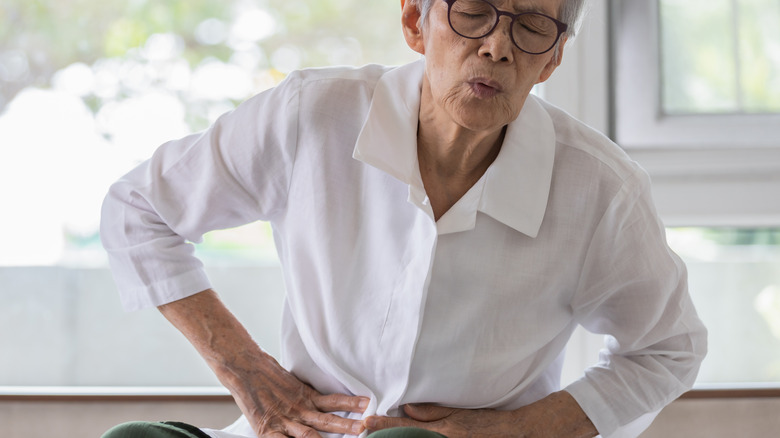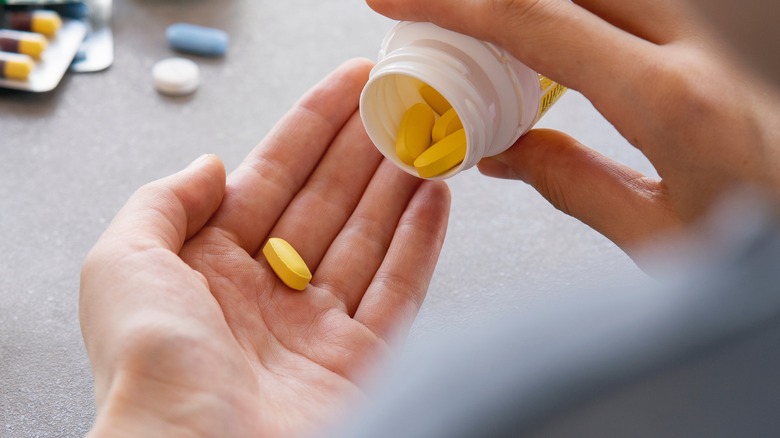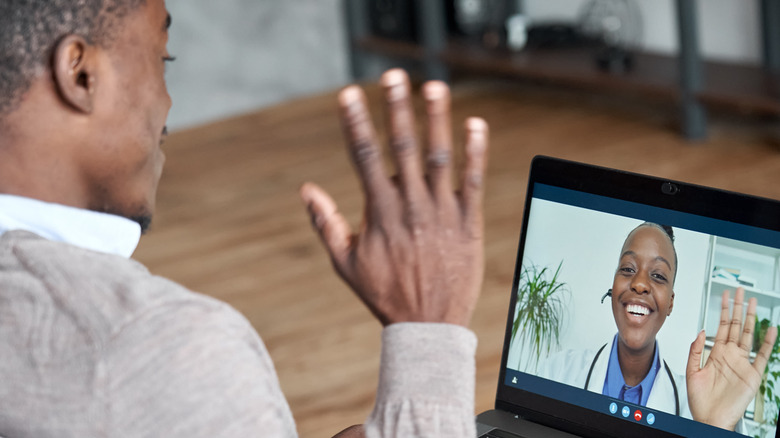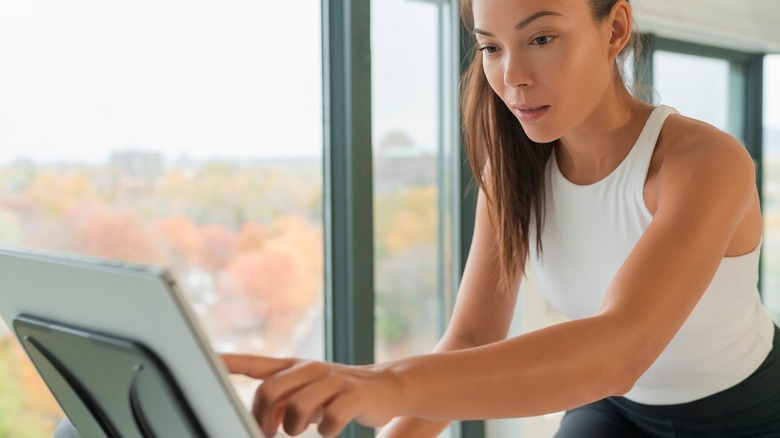How To Deal With An IBD Flare-Up
Inflammatory bowel disease (IBD) might be more common than you think. Roughly three million people live with IBD in the United States, with the number of people being diagnosed with the condition rising in the last few decades (via the Centers for Disease Control and Prevention). IBD is characterized by (as you might expect) inflammation in the bowel area and throughout the gastrointestinal tract, and when it flares up, it can create some less-than-ideal symptoms, including abdominal pain, diarrhea, constipation, or the immediate need to go to the bathroom (per the Crohn's & Colitis Foundation).
As such, for people living with IBD, learning how to manage a flare-up is crucial. And whether you have ulcerative colitis or Crohn's disease – IBD is an umbrella term for these two conditions, both of which affect the lower GI tract in slightly different ways, per UCLA Health – there are some key strategies you can employ that can make your life easier when IBD rears its head. Let's go through the best ways to deal with an IBD flare-up.
What does a flare-up look like?
Whether you're newly diagnosed with IBD or have been living with the condition for some time, it's a good idea to check in on what a flare-up normally looks like.
Generally, IBD will manifest in waves, with periods in between where there are fewer or no symptoms (via the Mayo Clinic). When that wave comes in the form of a flare-up, though, things can get troublesome. Flare-ups generally involve increased activity in the bowel and abdominal tract, which may appear as an increased frequency of going to the toilet, more need to go to the toilet at night, and abdominal aches and pains (per Crohn's & Colitis UK). People may also find that when they do go to the bathroom, their stools are looser, or that they have diarrhea.
Flare-up symptoms aren't just isolated to the gut and gastrointestinal tract. Individuals may also experience tiredness or fatigue, swelling in the joints and behind the eyes, and rashes on their skin. IBD can also have a powerful impact on mental health, with people feeling low or anxious during and around a flare-up.
Keep an eye on what you're eating
When you're having a flare-up, your dietary choices can significantly impact the severity of your symptoms, as the Crohn's & Colitis Foundation states. Foods that are especially high in insoluble fiber (like cruciferous vegetables and whole grains) may trigger additional symptoms like bloating or diarrhea, or worsen existing ones. It may also be the case that you find it more difficult to tolerate high-fat or high-sugar foods, dairy products like cream or cheese, foods that have sorbitol in them, or spicy foods. All of these can be trickier to digest and may prompt further discomfort.
Instead, you should try eating foods that are easier on the GI tract, like bananas, refined grains like white pasta or rice, and lean protein (e.g., chicken, fish, tofu). It's worth remembering that not everyone will be triggered by the same foods, and your doctor may recommend you follow a specific diet or try an elimination diet (to determine what your specific problem foods are). With that said, significantly limiting your diet during and around a flare-up may cause issues with nutrition, so make sure you consult a healthcare professional about any dietary modifications.
Know where the bathroom is
Anyone who's ever dealt with an IBD flare-up will know that when you need to go, you need to go. And knowing how to locate a bathroom quickly enough can make your life a heck of a lot easier. While this may be easier when you're at home or work, when you're out and about, this can be quite a challenge. That's why getting a specialized app that allows you to find toilets nearby, like Charmin's SitOrSquat, could be a great idea.
Getting a Restroom Access Card can also make your life a lot easier, as Healthline states. These cards, issued by the Crohn's & Colitis Foundation, can make persuading hesitant staff members who don't want to let you use their restroom a lot easier, while also saving you from a potentially difficult conversation. Simply sign up via the Crohn's & Colitis website.
Additionally, it's always a good idea to carry certain items with you at all times, in case you find yourself caught short while you're outside. Healthline suggests putting some toilet paper, hand sanitizer, any medication your doctor recommends you keep on hand, and some extra underwear in your bag.
Medication may not be your friend
When you're dealing with an IBD flare-up (or, indeed, when you're dealing with any health condition), it can be tempting to assume that medication will deal with all of your woes. But bear in mind that you should never prescribe yourself medication, and that doing so could have some serious negative consequences.
Anti-diarrhea medication, for example, could reduce some symptoms, but you should speak to your doctor before taking it, according to Miller School of Medicine's assistant professor of gastroenterology Oriana Mazorra Damas (via Everyday Health). Not only do you need to know the correct dose and manner in which to take your medication, but taking anti-diarrhea tablets also reduces colon activity, which means that certain bacteria that you could be more susceptible to (thanks to your IBD) could hang around and potentially cause or worsen an infection. You should also stay away from certain types of painkillers like opioids, says Damas, as well as NSAIDs like ibuprofen.
Bear in mind that not all medication is off the table. People who have a fever as part of their flare-up might find taking acetaminophen helpful, and antispasmodic medication may help to reduce abdominal pain or cramping. Make sure you're checking with your doctor before taking anything, though.
Limit how much you smoke
When we think of the impact of smoking on our bodies, we usually go to the lungs first. But the truth is that smoking can lead to a slew of problems in different areas of the body — and can be particularly problematic for people who have Crohn's disease (via the Crohn's & Colitis Foundation). Smoking is pretty much all bad news when it comes to flare-ups, and can contribute to them occurring with greater frequency. A smoking habit can also raise a person's chances of getting Crohn's disease in the first place. So, if you do smoke and you have Crohn's, there are no prizes for guessing what we're gonna say next: Try to cut down or quit entirely. Quitting smoking can reduce how often you get flare-ups. It can generally make your condition more manageable, as well as improve your quality of life in other areas.
However, when it comes to ulcerative colitis, somewhat mysteriously, being a smoker seems to make it less likely that you'll develop the condition. But when you consider the fact that smoking can raise your risk of everything from gum disease to colorectal cancer to type 2 diabetes (per the American Lung Association) in addition to impacting other health areas, it's no surprise that we don't recommend continuing based on ulcerative colitis risk alone.
Consult your doctor
When you're having a flare-up, there's one person who will be your closest ally: Your doctor. While you may be able to judge the nature of your flare-up based on experience, you must keep your physician in the loop when you're experiencing IBD symptoms, especially if they're more severe than usual (per Healthline).
Worrying symptoms during a flare-up include rectal bleeding, vomiting, persistent diarrhea, or extreme cramping, and all of these may necessitate further healthcare. Your doctor will be able to advise you on how best to manage your symptoms. In some situations, they may recommend that you seek immediate treatment, either via an emergency appointment, going to urgent care, or heading to the emergency room.
Also, remember that keeping your doctor in the loop about how your flare-up is panning out will allow them to make better decisions about your future healthcare. So make sure that you're telling them the whole story, and provide them with as much information as possible.
Ensure you stay hydrated
During an IBD flare-up, you're likely going to be pretty occupied by your symptoms. But there's one thing you absolutely must stay on top of when your IBD rears its head, and that's your hydration. Having diarrhea may cause you to become dehydrated fast, as your body loses more fluids than it can replace at a rapid pace (via Everyday Health). This may be made even worse if you have a fever accompanying your IBD, and are sweating more than usual (per WebMD).
Try to avoid waiting too long to rehydrate during a flare-up: While thirst indicates that you need more fluids, it can mean you should have drunk some a long time ago. Instead, keep a water bottle handy, and keep sipping from it as the day goes on. You might also find it helpful to drink more than just water. Sports drinks are typically imbued with electrolytes that can replace lost salts and rehydrate you more effectively. Coconut water is also electrolyte-rich. Lastly, certain foods (like watermelon and cantaloupe) may be particularly hydrating, provided that your body can tolerate them during a flare-up.
Track your symptoms
If you have Crohn's or ulcerative colitis, you'll be well aware of what a flare-up feels like. But even if your flare-ups are fairly predictable, it's still important that you track your symptoms when you're having one (per Everyday Health).
Monitoring your symptoms — when they start, when they finish, and how severe they are — can help both you and your doctor identify any common traits or trends your condition shows, and can assist with determining the best mode of treatment. It can also show whether or not the treatment that you're currently on is working. It's also a good idea to track your diet around a flare-up, as doing so could expose a trigger food that you may not have realized was setting off your symptoms.
How you track your symptoms is up to you, but these days, using an app is probably the easiest way to do it. "Symptom tracker apps are more efficient, because notes taken with paper and pen have to be transcribed and can't be transmitted," states Mount Sinai Hospital's gastroenterologist James Marion (via Everyday Health). Oshi Health, myColitis, and the excellently-named Poop Master are all great choices (per Health Central).
Avoid hardcore exercise
We don't know about you, but we can get pretty annoyed when things get in the way of our exercise regime. But during an IBD flare-up, we recommend you take it easy a little on the workouts, as exercising especially strenuously can create significant issues, according to Health Central.
High-intensity interval training and other forms of hardcore exercise can be doubly stressful for your body, as in addition to having to navigate abdominal pain, constipation, and tiredness, you may also experience increased inflammation from the exercise itself, creating potentially worse symptoms.
But, you still need to stay active, right? We hear you. That's why we'd recommend opting for lower-intensity workouts like walking or yoga. Yoga has the added benefit of being an excellent way to reduce stress, and could be particularly beneficial for the emotional anxiety caused by ulcerative colitis, per research published in the International Journal of Yoga Therapy. Other types of exercise, like Pilates or golf, are a great way to stay active without stressing your body out. And remember, if you're heading to an exercise class, inform your instructor at the beginning about your condition. It'll help them adapt their class to your needs, and will keep them in the loop should you have to dash to the exit halfway through.
Try to reduce your stress levels
Going through an IBD flare-up can be a stressful experience in itself, but it can be helpful to remember that stress and the symptoms of IBD may be linked (via Healthline). Feelings of stress lead to an increase in activity throughout your body, with various hormones being created and biological functions sped up. This can lead to higher levels of body-wide inflammation. For individuals with ulcerative colitis, this can raise the inflammation in their colon, which can both prompt and aggravate symptoms.
Stress is also linked to a higher incidence of flare-ups and symptoms in people with Crohn's disease (per Healthline). That's why it's important to try and control your stress levels as much as possible (both during flare-ups and around them) to try and reduce the impact of IBD symptoms. Light exercise that won't exacerbate your symptoms is an excellent way to manage stress and anxiety. Practicing mindfulness techniques can also be especially helpful for people with IBD. As research published in Scientific Reports shows, individuals with IBD who undertook mindfulness-based therapy practices appeared to have lower inflammation overall.
Stay away from alcohol
When you're experiencing an IBD flare-up, sometimes you just can't. And grabbing a glass of wine while you're going through IBD symptoms might feel like a form of salvation. But we thoroughly recommend you save that glass, folks. Alcohol can affect your gastrointestinal system in several ways, making it potentially problematic to consume for individuals with IBD (via WebMD). Drinking alcohol can raise inflammation in your gut, inhibiting healthy function, and may also cause increased bowel movements. Alcohol also has a diuretic effect, and this can be troublesome when you're experiencing symptoms, as staying hydrated is crucial.
All of these effects are more noticeable if you drink more heavily, with excessive alcohol consumption being linked to a higher rate of IBD flare-ups. It's also important to remember that drinking too much alcohol can alter the makeup of your microbiome, the healthy function of which is crucial both to manage IBD and for general health (per research published in BMJ).
And if all that wasn't enough, alcohol can interact negatively with several medications, including metronidazole, which may be prescribed to individuals with ulcerative colitis. Have we convinced you to screw that bottle back up yet?
Open up to your friends and family
When people are going through difficult periods, they should never have to suffer in silence. And this is especially true when someone's going through a flare-up. It can sometimes be tricky to be open about your condition with your loved ones, but informing them of exactly what's happening to you (and what your symptoms may be) can enable them to support you, states Healthline.
It's also good to be clear about how they can best help you during a flare-up. They might be tempted to weigh in with advice that you might not find comforting (with the best of intentions, of course), so if you'd rather that they just lent an ear for you to talk about how you're finding it, let them know. If you're worried about your flare-up being particularly severe, it may also be prudent to provide them with necessary medical information and emergency contact numbers. Arguably the most important thing about telling your friends and family what you're going through, though, is that you can eliminate any shame or stigma around your condition.
Speak to your employer
It can be challenging to navigate discussions around health with your employer, but when it comes to IBD, having a chat with your boss can pay off.
"We advocate that our patients consider talking to their bosses about their disease if they are comfortable with that," advises Vanderbilt University Medical Center's assistant professor of medicine and gastroenterologist Robin Dalal (via Health Central). You may not feel at liberty to do so, but if you have an open and honest relationship with your employer, speaking to them about your IBD can help them to better understand your needs, be more flexible around bathroom breaks, and contextualize any days off that you may need to take when you're sick.
It can be a good idea to speak to your manager within a scheduled meeting time, so that you can clearly express your needs and discuss how they fit in with legal protections around illness and disability. "Be polite and respectful, but firm," especially when it comes to your needs from them, states Henry Ford Inflammatory Bowel Disease Center's co-director Jason Schairer. Ultimately, it's in your employer's interest to make accommodations for your needs, and doing so will hopefully make your working environment and relationships stronger.
Remember, IBD flare-ups aren't just physical
IBD can produce some enormous physical symptoms, but your mental health can be affected, too. Feelings of sadness and depression may occur while you're having a flare-up (per the Crohn's & Colitis Foundation), but they can also be more common in general for individuals who have IBD.
"We see in patients of all chronic disease states a higher incidence of depression because of dealing with life-changing events, and IBD patients are no exception," explains gastroenterologist for Nebraska Medicine Derrick Eichele (via Nebraska Medicine). This can stem from the very nature of living with the condition, and its impact on your day-to-day navigation through life.
Thus, it's important to stay on the lookout for symptoms of depression and anxiety, and to take action if you feel that it's impacted you. Having a continually low or anxious mood, being unable to manage negative thoughts or worries, feeling more tired than usual, and finding it difficult to concentrate are all symptoms of a mental health condition that might need addressing. Remember, though, that while depression and anxiety can be challenging, there is a wide range of treatments available to tackle them. Speak to your doctor to see what they can do to help.
If you or someone you know needs help with mental health, please contact the Crisis Text Line by texting HOME to 741741, call the National Alliance on Mental Illness helpline at 1-800-950-NAMI (6264), or visit the National Institute of Mental Health website.















